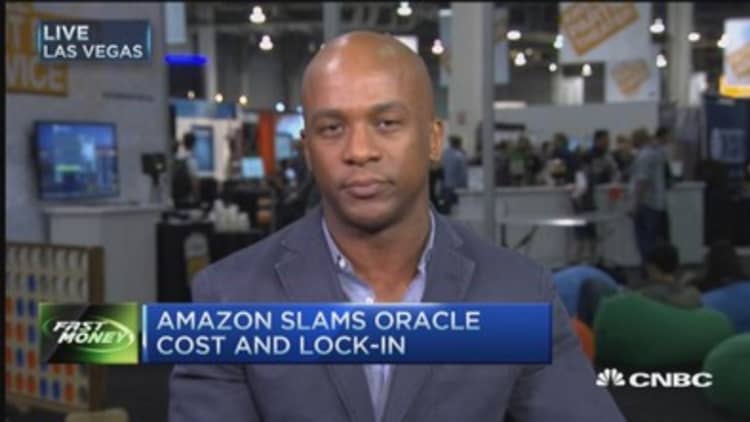
It used to be upstarts like Salesforce and Box that took turns jabbing at the enterprise giants. But at Amazon's AWS re:Invent conference Wednesday, it was Amazon taking aim at Oracle.
"Amazon senses a target of opportunity," Forrester analyst Jeffrey Hammond said. "They are listening to customer complaints about Oracle's pricing, we hear them too, and are taking action."
Andy Jassy, head of Amazon Web Services, kicked off his keynote saying the conference is not your typical sales and marketing event.
"We didn't wanna do a conference that was like all the other enterprise technology conferences. Because they tend to be real big sales and marketing conferences and very corporate and not very valuable to the participants," he said.
Oracle and Salesforce host two of San Francisco's biggest annual events, called Oracle OpenWorld and Dreamforce, respectively. This year the Foo Fighters headlined Dreamforce.
"You don't have to sell me on going to a Foo Fighters show," Jassy told CNBC. "But I think that for us, we don't view ourselves as the typical corporate enterprise technology company that's looking to sell, you know, whatever they can sell to customers at the highest possible price they'll pay."
Oracle did not immediately respond to requests for comment, and Salesforce declined to comment.
Amazon is playing scrappy upstart to what Jassy terms the "old guard." Oracle is the biggest provider of traditional databases, a business that has been shrinking as more companies migrate key operations to the cloud.

"The technology area that's been slowest to adapt to the cloud, that's still steeped a little bit in the old world, is the database space," he told CNBC. "What that means for customers is that they're paying way too much. And they're being locked into these proprietary old-guard database providers."
On stage, Jassy highlighted a post poking fun at Oracle's strong-arm tactics to lure customers to its own cloud service — to the 19,000-strong developer crowd.
"It's rare that I meet an enterprise that isn't looking to flee from their current database provider," he said.
This year at AWS re:invent, Amazon Web Services rolled out a slew of new products aimed at speeding migration to the cloud, something Jassy said customers are demanding.
"We've really doubled down on the database space over the last number of years. And we have built these new database offerings from the ground up with the cloud in mind, which means that they're very scalable. They're very flexible. And they're very cost-effective," he said.
Forrester's Hammond said the real question is, why now? He hypothesized that it's because many customers have already seen "great success" replacing operating systems, like Linux for AIX, Solaris and Windows, as well as app servers like Tomcat and JBoss for IBM WebSphere and Oracle WebLogic.
Hammond noted that data management and virtual machines are the next two product categories where companies spend a lot of money on commercial software, and are not happy about it.
"[It's a] classic attack of adjacent markets, in this case with customers ready to consider product substitution," he said.
For its part, it seems clear that Amazon plans to stop at nothing less than total dominance.
"Our goal is to have every company run all of their businesses and all of their applications on top of our technology infrastructure platform," Jassy said.
— CNBC's Jon Fortt contributed to this report.
(CORRECTION: This story was updated to clarify Amazon's comments.)





